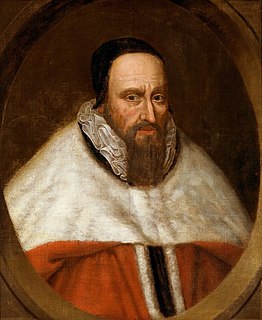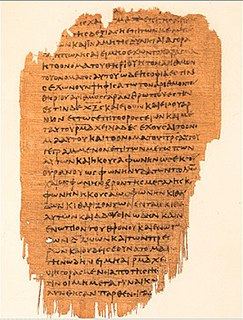
The King James Version (KJV), also known as the King James Bible (KJB) or simply the Authorised Version (AV), is an English translation of the Christian Bible for the Church of England, begun in 1604 and completed as well as published in 1611 under the sponsorship of King James I of England. The books of the King James Version include the 39 books of the Old Testament, an intertestamental section containing 14 books of the Apocrypha, and the 27 books of the New Testament.

William Tyndale was an English scholar who became a leading figure in the Protestant Reformation in the years leading up to his execution. He is well known for his translation of the Bible into English.

An apocalypse is a disclosure or revelation of knowledge. In religious and occult concepts an apocalypse usually discloses something hidden, or provides what Bart Ehrman has termed "a vision of heavenly secrets that can make sense of earthly realities". Historically, the term has a heavy religious connotation as commonly seen in the prophetic revelations of eschatology obtained through dreams or spiritual visions. The biblical Book of Revelation depicts as an "apocalypse" the complete and final destruction of the world.

The Revised Version (RV) or English Revised Version (ERV) of the Bible is a late 19th-century British revision of the King James Version. It was the first and remains the only officially authorised and recognised revision of the King James Version in Britain. The work was entrusted to over 50 scholars from various denominations in Britain. American scholars were invited to co-operate, by correspondence. The New Testament was published in 1881, the Old Testament in 1885, and the Apocrypha in 1894. The best known of the translation committee members were Brooke Foss Westcott and Fenton John Anthony Hort; their fiercest critic of that period was John William Burgon.

Partial Bible translations into languages of the English people can be traced back to the late 7th century, including translations into Old and Middle English. More than 450 translations into English have been written.

The New English Bible (NEB) is an English translation of the Bible. The New Testament was published in 1961 and the Old Testament was published in 1970.

The Revised English Bible (REB) is a 1989 English-language translation of the Bible and updates the New English Bible of 1970. As with its predecessor, it is published by the publishing houses of both the universities of Oxford and Cambridge. It is not to be confused with the "Revised English Bible" of 1877, which was an annotated and slightly corrected version of the King James Bible.

Samuel Ward (1572–1643) was an English academic and a master at the University of Cambridge. He served as one of the delegates from the Church of England to the Synod of Dort.
Robert Tighe, was an English cleric and linguist. He was educated at both Oxford and Cambridge and served as Archdeacon of Middlesex (1602–1616) and Vicar of the Church of All Hallows, Barking, London. He left his son an unusually large estate of £1000 per annum. He was among the "First Westminster Company" charged by James I of England with the translation of the first 12 books of the King James Version of the Bible.
William Barlow was an Anglican priest and courtier during the reign of James I of England. He served as Bishop of Rochester in 1605 and Bishop of Lincoln in the Church of England from 1608 until his death. He had also served the church as Rector of St Dunstan's, Stepney in Middlesex and of Orpington, in Kent. He was also Dean of Chester Cathedral, and secured prebends in Chiswick and Westminster.

John Richardson was Master of Trinity College, Cambridge from 1615 until his death.
Andrew Bing (1574–1652) was an English scholar. He was a fellow of Peterhouse, Cambridge, and succeeded Geoffrey King as Regius Professor of Hebrew at Cambridge. He served on the "First Cambridge Company" charged by James I of England with translating parts of the Old Testament for the King James Version of the Bible.

William BranthwaiteD.D. was an English scholar and translator.

The biblical apocrypha denotes the collection of apocryphal ancient books found in some editions of Christian Bibles in a separate section between the Old and New Testaments or as an appendix after the New Testament. Some Christian Churches include some or all of the same texts within the body of their version of the Old Testament.

Revelation 8 is the eighth chapter of the Book of Revelation or the Apocalypse of John in the New Testament of the Christian Bible. The book is traditionally attributed to John the Apostle, but the precise identity of the author remains a point of academic debate. In this chapter, the seventh seal is opened, the vision of the opening of the other six seals having been reported in chapter 6, and the first four angels' trumpets are sounded.

Revelation 20 is the twentieth chapter of the Book of Revelation or the Apocalypse of John in the New Testament of the Christian Bible. The book is traditionally attributed to John the Apostle, but the precise identity of the author remains a point of academic debate.

Revelation 19 is the nineteenth chapter of the Book of Revelation or the Apocalypse of John in the New Testament of the Christian Bible. The book is traditionally attributed to John the Apostle, but the precise identity of the author remains a point of academic debate. In this chapter, heaven exults over the fall of Babylon the Great.

Revelation 21 is the twenty-first chapter of the Book of Revelation or the Apocalypse of John in the New Testament of the Christian Bible. The book is traditionally attributed to John the Apostle, but the precise identity of the author remains a point of academic debate.
Isaiah 29 is the twenty-ninth chapter of the Book of Isaiah in the Hebrew Bible or the Old Testament of the Christian Bible. This book contains the prophecies attributed to the prophet Isaiah, and is a part of the Book of the Prophets. The Jerusalem Bible groups chapters 28-35 together as a collection of "poems on Israel and Judah".














